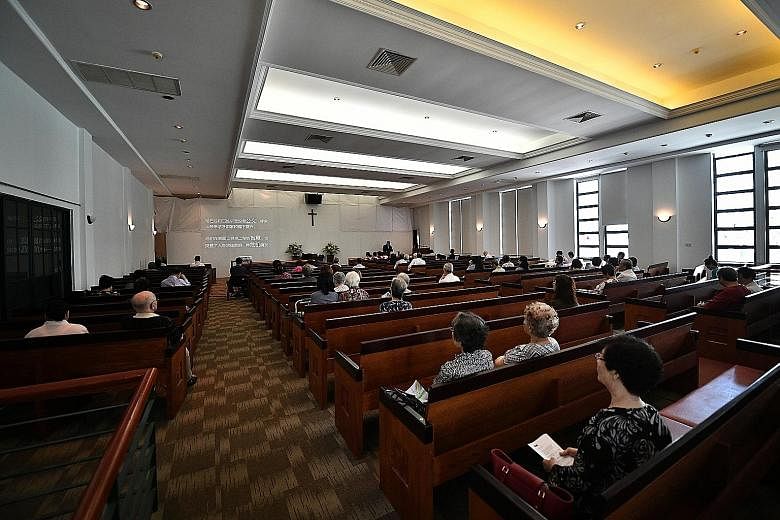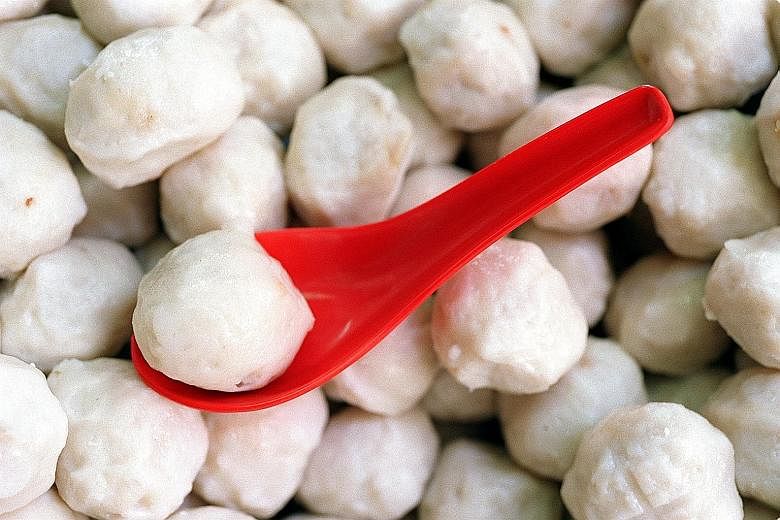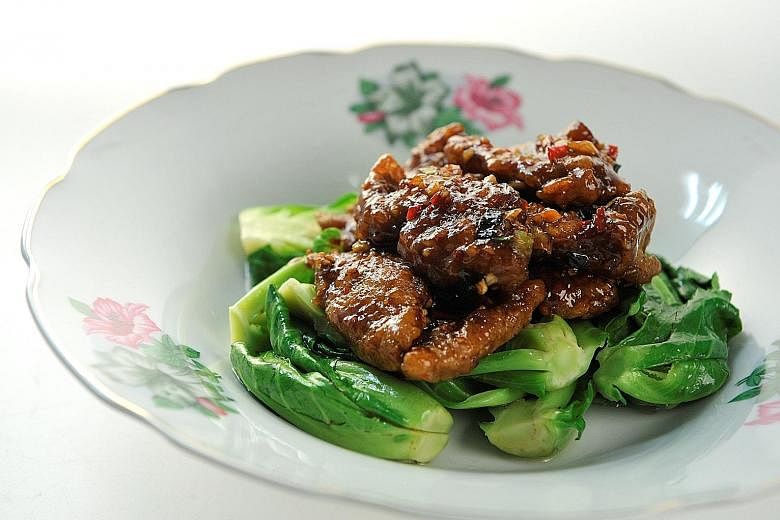Whenever Mr Ting Tau Nay and his family want some privacy in public, they turn to Hock Chew - a dialect they are sure few strangers would understand.
The obscurity of Hock Chew has turned it into a secret language of sorts for its speakers here. In 2015, Hock Chews made up less than 2 per cent of the resident Chinese population here, according to the general household survey.
"There's little chance for us to speak Hock Chew, except maybe when we are sharing a table while eating outside and don't want other people to understand what we are talking about," said Mr Ting, 54, an assistant business and economic officer at the Singapore Foochow Association.
Still, a common phrase such as ni xie ba bui?, Hock Chew for "Have you eaten?", can likely be understood by Hokkien speakers as well as it sounds similar to the Hokkien equivalent.
Mr Ting, his wife and their two sons, aged 28 and 18, are fluent in Hock Chew, but the family of four is likely an exception here.
-
About Hock Chew
-
ORIGINS
Hock Chew is spoken in at least 11 places in the south-eastern Chinese province of Fujian, including Fuzhou City. The pronunciation and vocabulary may differ from place to place.
In Singapore, the dialect was brought over by migrants from Fuzhou, who initially arrived here to perform hard labour. It was common for these migrants to work as carpenters, trishaw riders, barbers, chefs and tailors, among other roles.
Subsequently, many of these migrants opened their own coffee shops. At its peak, more than 50 per cent of coffee shops in Singapore were owned by Hock Chews.
NUMBER OF SPEAKERS
While there are no definitive statistics on the number of speakers here, the Singapore Foochow Association estimates that less than half of the nearly 57,000 Hock Chews in Singapore are proficient in the dialect.
WHERE TO LEARN IT
The Singapore Foochow Association plans to hold a series of 10 lessons from September to October.
The sessions will be held once a week and last 11/2 hours. The course will cost $20. Members of the public are welcome to sign up.
NOTABLE HOCK CHEWS IN SINGAPORE
MPs Tin Pei Ling (MacPherson) and Ang Hin Kee (Ang Mo Kio GRC) are Hock Chews.
FOOD SPECIALITIES
Fuzhou fishballs which are filled with meat; red rice wine soup, made from red yeast and glutinous rice; Fuzhou yan pi, wantons filled with meat and water chestnuts; and Fuzhou oyster cake, where meat, oysters and other seafood are encased in flour batter.
Charmaine Ng
Less than half of the 56,802 Hock Chews living in Singapore in 2015 could speak the dialect, according to estimates by the Singapore Foochow Association.
The language, which originated from Fuzhou in Fujian province, is one of the most difficult Chinese dialects to learn, as much of its pronunciation and vocabulary are drawn from ancient Chinese languages dating back to more than 1,200 years ago, said Mr Lin Dan Wen, 61, the education and culture officer at the Foochow Association
Compared with Mandarin, which has four tones, Hock Chew has seven - posing a challenge for new speakers, even those fluent in Mandarin. While Cantonese and Hokkien each have more than four tones too, they are usually easier to pick up as they are more commonly used in Singapore.
"Some of the phrases in Hock Chew were used in ancient Chinese contexts, and are difficult to explain to modern speakers," said Mr Lin.
For example, the phrase ga lang ma is used to describe people who are dishonest and deceitful. The phrase translates to jia san ma in Mandarin, and originates from how cheats would operate in ancient China by "adding three measurements" to overcharge someone.
Given the low number of speakers here, Hock Chews often find themselves gradually losing fluency in their dialect, as they have little chance to practise it.
This is the case for undergraduate Dion Chen Hang, 27, who moved to Singapore from Fuzhou with his parents when he was 15.
With none of his Singaporean peers able to speak Hock Chew, his ability to speak the language he grew up with is now slowly eroding.
"I used to speak to my Fuzhou friends in Hock Chew about everything, but now I only speak to my parents in Hock Chew," said Mr Chen, a third-year mechanical engineering student at the Nanyang Technological University.
"Because of that I'm slowly forgetting a lot of the vocabulary in Hock Chew," he added.
In Singapore, the Foochow Methodist Church is one of the few places where Hock Chew can be heard regularly.
Every Sunday morning, at the chapel in Race Course Road, songs of worship, Bible passages and sermons are delivered almost entirely in Hock Chew - probably the only church here that does so.
While the Holy Trinity Church in Hamilton Road also uses Hock Chew in its weekly services, sermons are not delivered entirely in the dialect and instead translated on the spot from Mandarin.
For the 80 or so people who gather weekly at the Foochow Methodist Church for the Hock Chew service, the language brings back memories of their childhood.
"I grew up speaking the language, so attending a service in Hock Chew gives me a sense of closeness," said Madam Chen Siew Chee, 88, who has been a church member for about 70 years and is a second-generation Hock Chew in Singapore.
As there are 10 variations of Hock Chew, each with slight differences in pronunciation and vocabulary, Reverend Christopher Kong said he tries to preach in a "plain, flat" version of the dialect.
"The pronunciations between the different types of Hock Chew can be very different, so we try to use those that are commonly understood," said Rev Kong, 42, who has been preaching in the language for seven years.
Much of the nuances is lost when preaching in Hock Chew, he added, as it is hard to translate idioms and some Chinese expressions into the dialect. "It's okay if you've having a typical conversation in Hock Chew, but it's very different to do a scripture reading or to preach in the dialect," he said.
As a result, the Hock Chew sermons are often simplified versions of the Mandarin sessions, and Rev Kong sometimes uses Mandarin phrases to aid his delivery.
The church, which was founded in 1897 by a small group of Hock Chew labourers, started out offering services in the dialect. But as church membership grew, it began to offer services in Mandarin, English and, more recently, Tamil.
Today, the Hock Chew service is one of the most poorly attended at the church of 1,200 members. Numbers have been dwindling since five years ago, when Mr Ling Eng Ha took charge of the service.
This is partly because when senior church members die, younger ones rarely replace them, as most of them prefer to attend the English or Mandarin services, said Mr Ling.
Interest in the dialect has been on the decline, even though the Hock Chew population here has increased by 20 per cent from 2000 to 2015.
To keep the service alive, Mr Ling keeps a lookout for Hock Chew speakers - Singaporean or not - who might be keen to attend the service. Currently, only one-third of the church's membership are Singaporeans, with the rest from Hock Chew-speaking places, such as Sibu in Sarawak, and Sitiawan in Perak.
The church wants to keep its Hock Chew service going. "Within the working committee, we have a consensus that no matter what, we will do our very best to make the dialect service last as long as possible," said Rev Kong, who was born in Sibu and moved here in 1998.
If nothing is done to revive the dialect, he estimates that the Hock Chew service will probably only last for up to another 20 years.
"We need to preserve the dialect for as long as we can. It is really a pity to see it dying off in our era."




